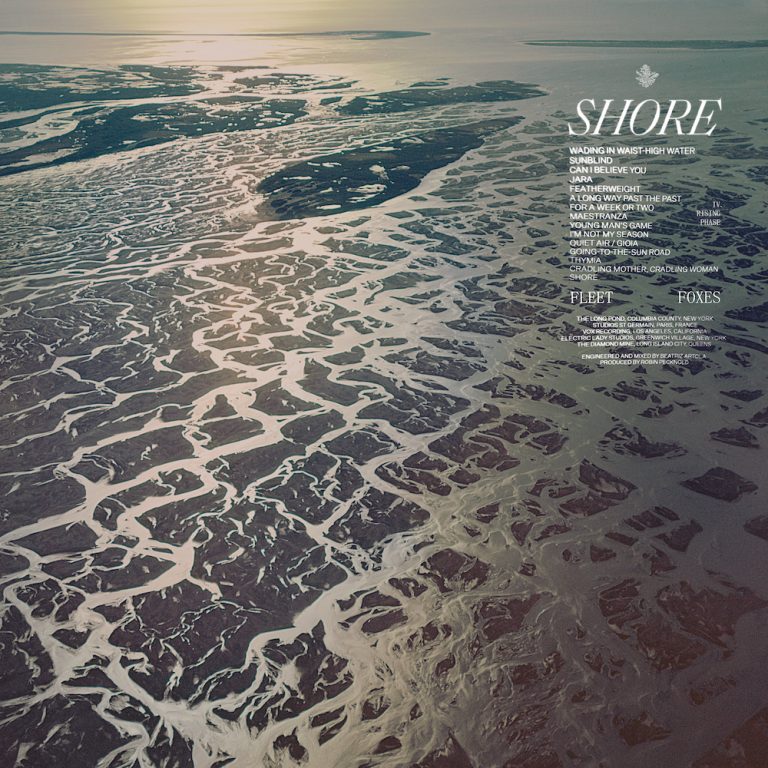Fleet Foxes releasing their new album, Shore, at the exact moment of the autumnal equinox is extremely on-brand for the band’s image, but quite uncharacteristic of mastermind Robin Pecknold. Their music will always be associated with verdant scenes and windswept imagery, ideally listened to by a fire with a cup of cocoa – but we’ve never known Pecknold to lean into what was expected of him.
Following the breakout 2008 double release of Fleet Foxes and Sun Giant, they were on track for crossover success, but the follow-up album Helplessness Blues was an attempt to take them off that track, as it did away with much of the radio-friendly hooks in favour of expansive songwriting. Yet, it still scored massively with critics and fans, and at this point Pecknold was approaching the kind of indie stardom that would have made him almost as recognisable as contemporaries like Sufjan Stevens – but instead Fleet Foxes disappeared for half a decade while he went to Columbia University. When they did return it was with the knotty, relatively dark – and for many, impenetrable – Crack-Up.
So, for Fleet Foxes to return with an album that gives listeners exactly what they want, when they want it, is a turn up for the books. But this is the crux of Shore: Pecknold is putting his anxieties to the side and trying to ignore expectation in favour of just making beautiful, open-hearted music that’s filled with upbeat melodies that sound great on a long drive.
This comes out loud and clear from Shore’s opening couplet of songs. For starters, the first voice heard on the album in opening track “Wading in the Waist-High Water” is not Pecknold’s distinctive amber tone, but that of Uwade Akhere, whose gorgeous lilt warmly welcomes us to this place of acceptance with open arms. When it does come time for Pecknold to take his bow on the following “Sunblind”, he picks up the baton of thankfulness perfectly, immediately paying tribute to many of his deceased musical heroes – Richard Swift, David Berman, Elliott Smith, and Judee Sill among them. What’s even more arresting is the bold and willing chorus, where he sings openly about the joy of making music in the footsteps of these greats, using his powerful voice to convey his hefty gratitude in a beam of pure radiant beauty in a way quite unlike he’s ever done before. “Sunblind” is the mission statement for Shore: giving an overdue dose of positivity back to a world of music that has given him infinite pleasure.
There are still moments of emotional strife, but this time around Pecknold approaches them from a constructive perspective. “Can I Believe You” tackles the eternal question of whether he’ll ever be able to fully open himself to someone else – but he comes at it face-on, with a powerful guitar buffeting up against his direct vocal hook. The subsequent “Jara” is as bright as a clear morning, and is a sort of riposte to the previous song’s question, as it finds him singing his way out of a funk – “first time any violet omens don’t shadow me around” – and being overwhelmed to realise that he has that special person in his life who is devoted to standing by him even when he’s “holding a weak excuse” or “heavy beneath blue.”
On “Featherweight”, Pecknold directly addresses his past tendency to over-burden himself with concocting grandiose compositions, admitting “Many men might die for what I’d renounce / I was staging life as a battle ground.” The track also offers up a slight evolution on the Fleet Foxes sound, as flecks of classical guitar and whispering percussion give it a quicksilver shimmer and hovering beauty, putting us inside Pecknold’s thoughts as realisation dawns on him.
This relative looseness of approach has opened up Pecknold to making some of the most downright fun-sounding Fleet Foxes songs to date. Overt brass injections give “A Long Way Past The Past” a dazzling brightness that seems to push him to overcome his reservations, while horns add regal sparks all around the smouldering “Cradling Mother, Cradling Woman”. The central pairing of “Maestranza” and “Young Man’s Game” are the first songs from the act to genuinely be said to have ‘grooves’; and the latter is also the most light-hearted he’s ever been lyrically, as he makes fun of his Arthur Lee-dressing, Ulysses-reading former self, admitting “I’ve been a rolling antique for all my life.”
There are still occasions where he brings the mood down to express something heavier, as on the hymnal “For A Week Or Two” and the acoustic balladry of “I’m Not My Season” and “Thymia”. On these occasions he reverts to pastoral imagery and naturalistic metaphors to make it sound more beautiful but less easy to directly interpret. Regardless, it never feels like Shore is burdensome; there is a gratefulness in everything he sings that is infectious and uplifting.
Even at their most stunning and accessible, Helplessness Blues and Crack-Up felt like Pecknold was trying to cut a path through mountains; giving us spectacular views, but unable to fully hide the industry and stress of getting to those points. Shore is almost the opposite, it is him following a path of lesser resistance through the landscape, writing actual choruses and melodic hooks, and finding that there is just as much natural brilliance and artistic merit to approaching his work in this manner. The album closes at the bottom of this winding trail with “Shore”, his reward and his sanctuary; a place outside of time and pressure where he can accept his abilities for the gifts they are and write without cynicism. “’fore I forget me / I want to record / while I see it all,” Pecknold sings. With Shore, he’s done it.


